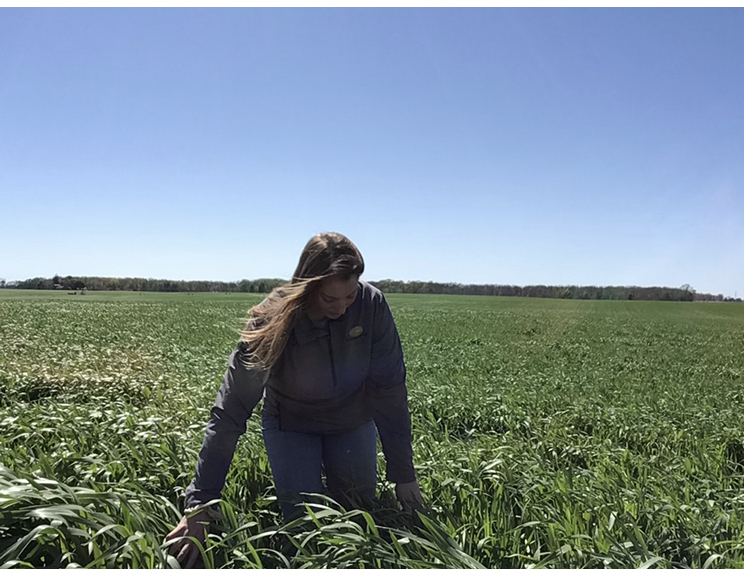Six years into her career, Sarah Houin looks back on her academic journey to offer cover crop advice to upcoming high school and college graduates interested in working in the cover crop industry

It’s been six years since Sarah Houin walked across the graduation stage at Purdue to receive her diploma for a degree in agronomic business and marketing.
A farm kid from a cattle, hog and row crop family enterprise in southern Indiana, present day finds Houin as a crop consultant with a specialty in cover crops for Co-Alliance in the northern part of the state.
While in many ways her career is just getting started, she’s amassed a notable amount of experience since leaving her hometown 10 years ago through building a college resume to gain relevant work experience to landing her first job straight after college graduation.
As high school and college students prepare to graduate and think about their future careers, Houin has nine pieces of advice to pass on.
Cover Crop Advice For Ag Students
Don’t feel like you’re locked into your major – or school
A self-proclaimed nature lover, the environment has always been a passion of Houin’s. This made it a natural fit for her to attend the University of Indiana following high school to study environmental sciences – or so she thought.
“When deciding on majors and schools, I thought going the environmental route was something I wanted to do without the boots on the ground farming component of it all,” she says. “But something I quickly realized within my first semester was how much I missed the agricultural industry. In environmental sciences, you’re talking about agriculture in some areas of work, but you’re not really involved in it wholeheartedly.”
As Houin points out, moving away from home and going to school is already a huge transition, so students shouldn’t stress if they feel like they’ve made the wrong decisions in their study area as they get familiar with their new life chapter.
“I finished out my first year and then transferred to Purdue to study agronomic business and marketing. I loved the change to Purdue and the agricultural classes they offered – changing direction was the right choice,” she says.
Diversify your class schedule
Differing from her original path of environmental sciences, Houin’s degree choice was a result of not knowing exactly what she wanted to study.
“My degree was basically in agronomy, so very heavy in chemistry classes with a few marketing classes mixed in,” she says.
While marketing is not something she would have typically gravitated towards, she found the diversity to be a surprisingly useful area of education. This has led her to advocate for students to not stick strictly to their major curriculum and look for classes that offer practical and useful skills that can be translated into different aspects of life.
“At the time, a few of the marketing classes felt like I was just going through the motions, but they made me start thinking outside of the box and thinking more creatively,” she says. “This has been very beneficial to make me more marketable when working on the sales side of things later in my career.”
Try to get a job during the school year linked to the industry you want to go into
Even if a student is in a fortunate enough position to not need to work while in school, Houin strongly advises everyone to try and get a part-time job related to their industry to start gaining work experience in that field. For her, this looked like working in a genetics lab sorting corn samples and working as an agronomy teacher’s advisor.
“When it comes to landing internships and jobs post-graduation, work experience is essential. Gain as much experience in your field as possible to set yourself apart from others,” she says. “While I wasn’t doing any high-level stuff, I started to build a record of being a dependable employee and experience in different areas of the industry. This helped me get a leg up on opportunities at a younger age because I was 20-years-old with three years of relevant experience in agriculture.”
Take internships
“Classes and getting decent grades are important but internships are priceless for hands-on learning,” says Houin.
The first internship is typically the hardest for college students to get due to having limited work experience and many ag companies prioritizing juniors and seniors to find future employees. Houin was able to get her foot in the door by leveraging a relationship with the local Co-Op to scout fields for the summer. The following two years, she secured summer internships with Dow and Cargill based on previous work experience and being open to temporarily relocating out of state.
“At that age, moving out of state can push people outside of their comfort zones – but that is a good thing! Aside from it creating more opportunities for work experience, you learn so much more about yourself and what you are capable of,” she says.
Houin also advises students to not be too particular about what internships they will and won’t do.
“I took part in Cargill’s crop scouting program, which wasn’t the most glamorous job, but I learned so much practical information. This led to Cargill offering me a job once I graduated,” she says. “Don’t be rigid about location and internship responsibilities. This is a priceless opportunity for you to gain real-life work experience and for a potential employer to test you out.”
Network
As part of internship programs and industry related jobs during the school year, Houin encourages students to build a network of professionals and fellow students to keep up with since many job opportunities occur through word of mouth.
“Also, join field-related organizations at your school and put yourself out there – you have nothing to lose!” she says.
Broaden your horizons
Especially for in-state students, when a student attends a school in the same or similar type of area they grew up in, it is easy to have a narrower focus on how things are done. For Houin, her eyes were opened and her mindset changed after studying abroad in Europe and seeing how different parts of the world farm.
“This was an amazing experience. I was able to see the challenges and benefits of the different climates they had and what their opportunity limits were. What struck me is that they are making a living on fewer acres by incorporating more diversity – which is something that stuck with me,” she says. “It showed me that there are a lot of opportunities to separate yourself and your operation from the rest by not just growing yellow number two corn.”
Learn to think for yourself
In the same line of broadening horizons, Houin advocates for students to listen to their professors and keep up with what is happening in the industry, but to form their own opinion and thought process on matters.
This is where her journey into cover crops really began.
I did a lot of my own research because whether you’re in college or working in the industry itself, things can be very one-sided for how everyone’s used to doing things because a lot of times it is working and producing food. But then I started to look at things differently – we need to produce food, but we need to do it in a way that is not deteriorating our soil,” she says.
Where Houin found success in this process was absorbing as much as possible from her classes and comparing it with research in different areas and practices implemented across the country in specific areas such as weed control.
“I took a lot of chemistry courses and learned a lot about chemical applications and would ask the question of ‘what are they doing differently?’ when coming across different operations. It is really important to learn both sides of the industry so you can know what you don’t like and what makes sense to you. You have to be able to argue each side if you want to be successful,” explains Houin.
Be realistic with your first job
Two common mistakes Houin has seen when students enter the workforce are taking whatever job pays the most or holding out on accepting a position to find their “dream job.”
“You may think you know what you want to do, but until you are doing it you have no idea. And even if you do land your dream job, it might not turn out like you think it will,” she says. “Accepting a job doesn’t mean you are signing up for 20 years at a company, it is ok to move on if it isn’t a good fit. But be mindful of the investment it takes for them to hire someone so don’t be flighty and hop from one place to the next.”
While a high salary figure will be attractive for many students graduating and being monetarily driven isn’t necessarily a bad thing, Houin advises students to weigh out the pros and cons before making a decision purely based on money.
“Are you going to be required to move a lot and if so, will that fit in with your personal life? Will you actually enjoy what you will be doing or are you simply in it for the money? These are questions to seriously think about because it won’t be sustainable if it makes you miserable,” she says.
Build and maintain a trustworthy reputation
In a tightknit industry, reputation can help pave the way to success as much as it can block opportunities. As high school students enter into college and start networking with professors, fellow students and companies during internships, Houin advises them to start to build and maintain a reputation for being reliable and trustworthy – and to continue to foster that throughout their career.
“It is such a small industry that you will continue to run into people you know in a variety of professional settings,” she says. “If you’re the kind of person that people know they can trust and rely on, it will open a lot of doors.”
The future is bright
For students interested in going into agriculture with a specific focus on cover crops and taking a more holistic approach to food production, Houin believes the future is bright.
“Things are changing and people are realizing there are ways to protect and improve resources while remaining profitable,” concludes Houin. “It’s not about taking all we can get, it’s about creating a symbiotic relationship; mutualism.”
Cover Crop Corner is a new educational column from forage application company Grassland Oregon and free for print or digital distribution by media outlets. To be added to the distribution list, please email laura@abccomms.co.uk




